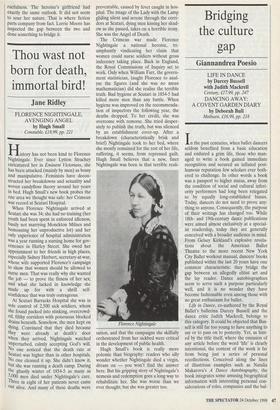Thou wast not born for death, immortal bird!
Jane Ridley
FLORENCE NIGHTINGALE, AVENGING ANGEL by Hugh Small Constable, £18.99, pp. 221 History has not been kind to Florence Nightingale. Ever since Lytton Strachey caricatured her in Eminent Victorians, she has been attacked (mainly by men) as bossy and manipulative. Feminists have decon- structed her breakdowns and sexuality and woven candyfloss theory around her years in bed. Hugh Small's new book probes the one area we thought was safe: her Crimean war record at Scutari Hospital.
When Florence Nightingale arrived at Scutari she was 34; she had no training (her youth had been spent in enforced idleness, busily not marrying Monckton Milnes and bemoaning her unproductive lot) and her only experience of hospital administration was a year running a nursing home for gov- ernesses in Harley Street. She owed her appointment to her friends in high places, especially Sidney Herbert, secretary-at-war, Whose wife supported Florence's campaign to show that women should be allowed to nurse men. That was really why she wanted the job — to prove the fitness of her sex; and what she lacked in knowledge she made up for with a shrill self- Confidence that was truly outrageous.
At Scutari Barracks Hospital she was in sole control of 2,500 sick soldiers, whom She found packed into stinking, overcrowd- ed, filthy corridors with poisonous blocked drains beneath. Somehow, the men kept on dying. Convinced that they died because they were already at death's door When they arrived, Nightingale watched unperturbed, calmly accepting God's will. No one noticed that the death rate at Scutari was higher than in other hospitals. No one cleaned it up. She didn't know it, but she was running a death camp. During the ghastly winter of 1854-5 as many as 5,000 men died under Nightingale's care. Three in eight of her patients never came Out alive. And many of these deaths were preventable, caused by fever caught in hos- pital. The image of the Lady with the Lamp gliding silent and serene through the corri- dors at Scutari, dying men kissing her shad- ow as she passed, takes on a horrible irony. She was the Angel of Death.
The Crimean war made Florence Nightingale a national heroine, tri- umphantly vindicating her claim that women could nurse soldiers without gross indecency taking place. Back in England, the Royal Commissions of Inquiry set to work. Only when William Farr, the govern- ment statistician, taught Florence to anal- yse the figures (and she was no mean mathematician) did she realise the terrible truth. Bad hygiene at Scutari in 1854-5 had killed more men than any battle. When hygiene was improved on the recommenda- tion of inspectors the following year, the deaths dropped. To her credit, she was overcome with remorse. She tried desper- ately to publish the truth, but was silenced by an establishment cover-up. After a breakdown (characteristically brisk and brief) Nightingale took to her bed, where she mostly remained for the rest of her life, suffering, it seems, from repressed guilt. Hugh Small believes that a new, finer Nightingale was born in that terrible reali- Florence Nightingale sation, and that the campaigns she skilfully orchestrated from her sickbed were critical in the development of public health.
Hugh Small's book is really more polemic than biography: readers who idly wonder whether Nightingale died a virgin, dream on — you won't find the answer here. But his gripping story of Nightingale's nemesis and redemption goes a long way to rehabilitate her. She was worse than we ever thought; but she was greater too.


















































































 Previous page
Previous page